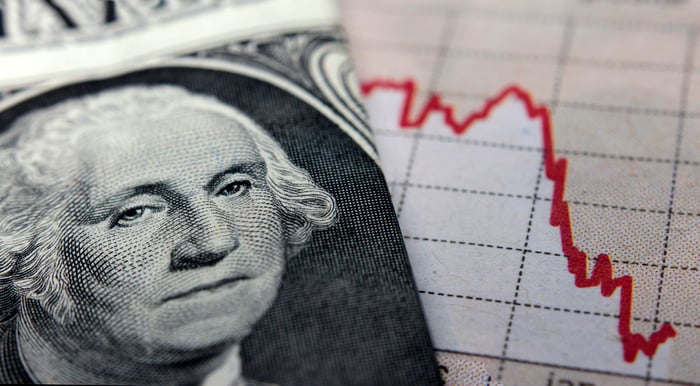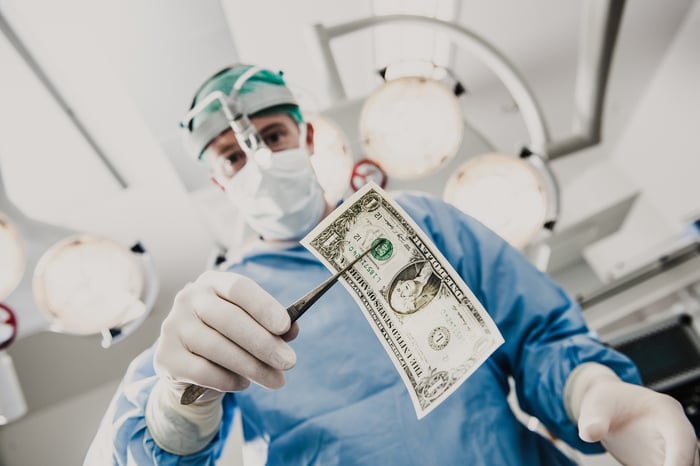This has been a year filled with big ups and downs for the investing community. The broad-based S&P 500 lost more than a third of its value in under five weeks, then recouped everything lost in less than five months. That's about a decade's worth of volatility crammed into half a year.
While the stock market offers few certainties, one thing we know is that market crashes are a natural part of the investing cycle. They're the price of admission to the greatest wealth creator on the planet.
Stock market crashes have historically been great times to put money to work in high-quality, innovative businesses. If you have, say, $2,000 you can set aside for investment purposes, I'd suggest buying into the following three stocks the next time the market crashes.

Image source: Getty Images.
Visa
Payment processing giant Visa (V 1.24%) is what I'd call a "don't-get-cute" buy during a stock market crash or correction. Visa is a cyclical company that could well take its lumps during a recession, but it's built to take advantage of long-term economic expansions. Since recessions are often measured in months, whereas bull markets are tallied in years, a bet on Visa puts the odds of long-term investing success in your favor.
Visa is the clear-cut credit card network market share leader in the United States. Between 2009 and 2018, Visa expanded its share of credit card network purchase volume by over nine percentage points, and currently holds more than half of all processing share for credit cards in the United States. That's a great position to be in considering that the U.S. is the No. 1 economy in the world, and approximately 70% of U.S. gross domestic product is tied to consumption.
Additionally, Visa has avoided the temptation to also become a lender like a few of its peers. Though lending could allow Visa to collect fee- and interest-based income, it would also expose the company to loan delinquencies during economic downturns. By simply sticking with payment facilitation, Visa avoids issues tied to credit loan delinquencies and keeps its profit margin above 50%.
Also, don't overlook Visa's longer-term opportunities beyond the United States. The company acquired Visa Europe in 2016 and has access to multiple underbanked regions of the world, including the Middle East, Africa, and Southeast Asia. It might sound crazy given its megacap size, but Visa has sustainable double-digit growth potential.

Image source: Getty Images.
Altria Group
When Wall Street's knees start quaking, investors would be wise to look toward consumer packaged goods companies that are usually unshaken by short-term fluctuations in the stock market -- like Altria Group (MO 0.68%).
I completely understand that some folks aren't willing to invest in tobacco stocks, but Altria offers a number of shareholder-friendly perks and modest growth opportunities.
This company can deliver sustainable single-digit profit growth thanks to its strong pricing power. Since tobacco is an addictive chemical, Altria can pass along price hikes on its premium and discount brands without having to worry about pricing its customer out of the market. Cigarette shipment volumes are down in the U.S. with fewer adults smoking, but Altria's pricing power and alternative product innovation are still driving profits higher.
Altria's smoking alternatives may appeal to a broader audience. It's expanding its U.S. market availability for the IQOS heated tobacco system and has $1.8 billion invested in Canadian marijuana licensed producer Cronos Group. Altria will likely work with Cronos in the quarters and years ahead to create cannabis vape products for the North American market.
As for capital returns, Altria has been known to repurchase its shares from time to time. It's currently paying out a rock-solid 8.6% yield. Reinvest your payout and you could double your money in a little over eight years.

Image source: Getty Images.
Intuitive Surgical
A crashing stock market is also the perfect time to go shopping for robotic surgical system developer Intuitive Surgical (ISRG 0.74%).
Healthcare stocks are such great investment opportunities because we don't choose precisely when or how we get sick. This creates a steady demand for drug and device companies, no matter how the U.S. economy is performing.
On a more company-specific level, Intuitive Surgical absolutely dominates the robotic surgical space. At the end of September, it had 5,865 of its da Vinci surgical systems placed around the world, with most in the United States. None competitor is remotely close to this number, making it highly unlikely that they'll be able to disrupt Intuitive's two decades' worth of rapport built with hospitals and surgical centers.
The Intuitive Surgical operating model is also designed to deliver better operating margins over time. In its early days, the bulk of the company's sales came from its pricey da Vinci system, which costs between $0.5 million to $2.5 million. Over the past decade, we've watched instrument and accessory sales, as well as servicing revenue, grow into the lion's share of sales for the company. Both of these operating segments generate substantially juicier margins than system sales.
Intuitive Surgical also has a long runway with which to expand the use of its robotic systems. Though it already holds significant share in gynecology and urology procedures, the da Vinci system has plenty of opportunity to pick up share in thoracic, colorectal, and general soft tissue surgical procedures.
In other words, it's a good bet to deliver for investors and a smart stock to pick up during a market crash.





